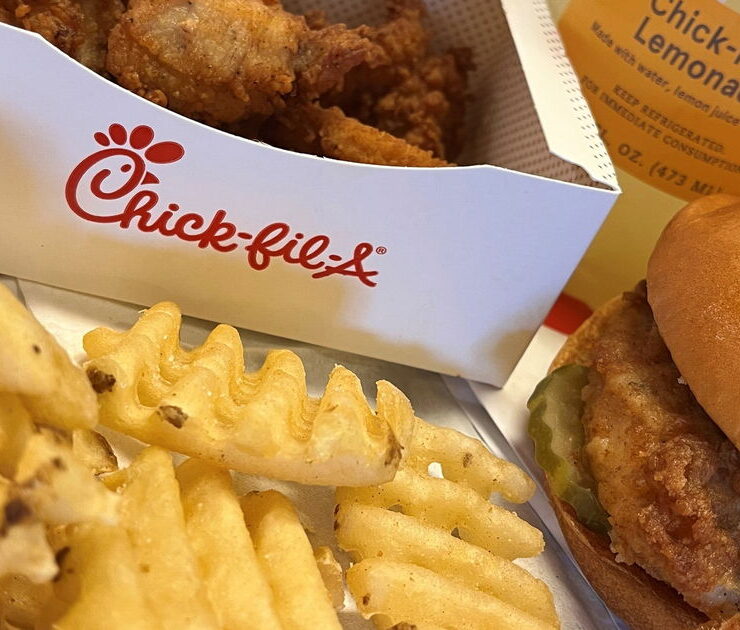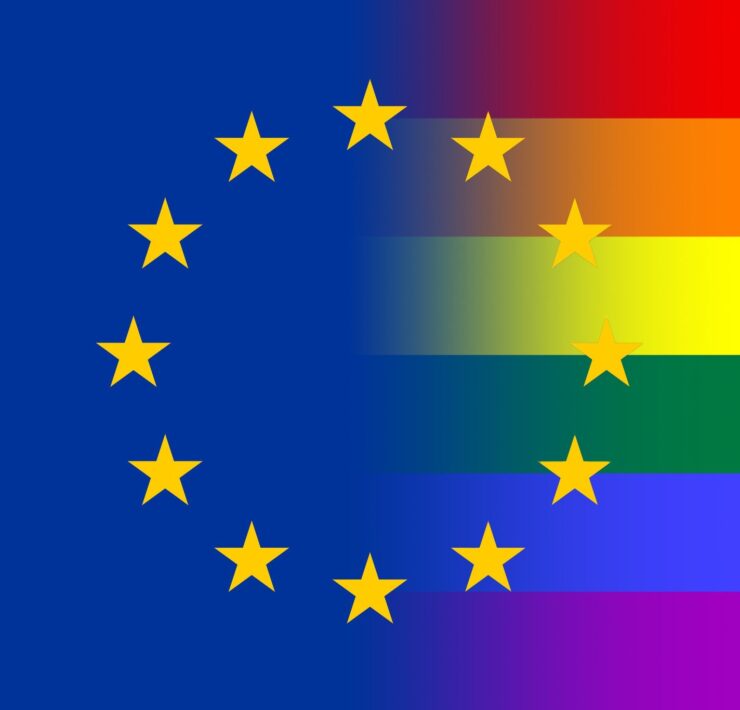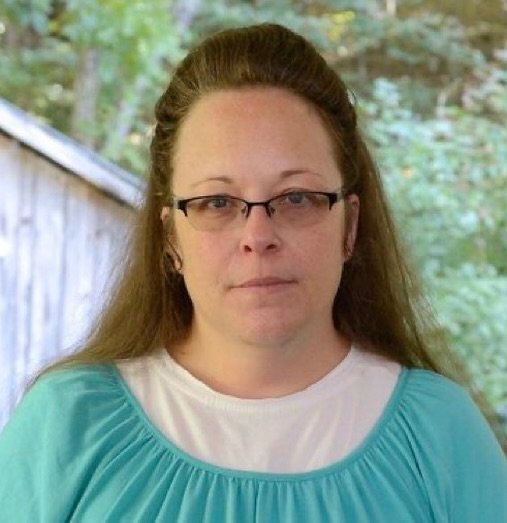Same-Gender Marriage Refections: An Open Letter to the Brides

I'm LA (as in tra-la-la) Bourgeois, the Lesbian Housewyfe—a 50+-year-old…
Dear Hannah & Caroline,
Each stitch on this afghan is infused with love. Just as the single strand of yarn knits together to become an entire blanket, your love weaves itself to become a life together.
Are you worried about the current attacks on the LGBTQ community that seem to come from everywhere? Are you worried that the courts and legislative bodies will erode our rights until our marriages are dissolved? Are you worried that you’ll look back on that day of your wedding ceremony and wonder where all the love from your community went?
Let me tell you a story….
When Stephanie and I began our journey, the idea of us getting legally getting married was ridiculously unattainable. As we came together in the autumn of 1992, Colorado passed Amendment 2, an amendment to the state constitution to legalize discrimination against the LGBTQ community. I remember the day after the election when the majority of folks we heard from said things like, “I had no idea that I needed to vote ‘no’ to say ‘yes, queer people should have the same rights as me.’”
At this point, it’s not even surprising that the men who wrote the amendment were experts in creating language that confused a “no” with a “yes.” After all, they’d been practicing that privately for years.
But that was just business as usual. We weren’t surprised and carried on in our rosy world of love and romance and wondrous amazement at our luck to have found each other.
In the car on a drive to visit Stephanie’s sister in Steamboat for Thanksgiving, Stephanie asked, “Wanna get married?”
“Oh yes!”
“Poof! We’re married,” she replied, and I laughed as surprise and wonder zinged through my body. Marriage wasn’t something out of reach. It wasn’t something denied to us because of our gender. It was something we could just decide. We could just grab this label and throw it over ourselves with abandon. And that’s all we could do, so we did it.
That’s why we’ll celebrate our 30th anniversary this upcoming Tuesday before Thanksgiving.
Over the ensuing years, a court case took Amendment 2 out of the law books, but Bill Clinton also signed the Defense of Marriage Act in 1996, a bill that defined marriage as between a man and a woman. AIDS was causing explosive landslides in this tapestry of chosen families as well, and the legal rights that marriage bestowed on partners became more than just a nice thing. It became a way that lovers could remain with their dying partner in the hospital room, even when the estranged biological family showed up to force away and erase those who loved the patient unconditionally from that dying person’s life.
Yeah, those were fun times.
We were lucky. During this dark time, our families supported our decision and recognized our union as a marriage. And we, on purpose, blithely sauntered through life, coming out to new friends and fellow workers and clients as a matter of course. Our philosophy was always that if you just live your life as you, then people actually start to see you as a person.
In the late 90s, of course, Ellen came out and that changed the landscape. This one act encouraged other famous people to reveal their gayness, and rumbled the country toward the legalization of same-gender marriage.
In 2002, we invited our friends and family to our marriage ceremony. Our invitations displayed an utterly perfect pear, and were inscribed with the line, “As Legal As We Want To Be.” In writing the ceremony, we structured the event so that everyone who was in the room joined together and spoke the words to marry us. That night was magical, a celebration of love and affection and joy.
We celebrate our second anniversary on November 30.
The wave of same-gender marriage legalization kicked off in Massachusetts in 2003. As other states continued to break down the barriers, Stephanie and I began to wonder about our future. Getting legally married seemed like a logical thing as we grew older, but we wanted to be smart about it. In 2013, civil unions became legal in Colorado, but if/when same-gender marriage became legal, we would have to dissolve the civil union in order to get married. However, if we got married in another state, our marriage would be recognized as a civil union in Colorado until same-gender marriage became legal.
On our next visit to my folks, we went to the courthouse in Fredrick, Maryland and got our marriage license. As we walked down the cobblestone sidewalk afterward, I marveled. “Did you ever expect to be able to get married?”
Stephanie shook her head. “Never.”
The following Saturday, my parents and nephew jumped into the car with us. We had agreed to meet at a popular lunch spot with our friend, Mary Kay, who was a preacher and had agreed to do the ceremony.
When we drove into town, rainbow-colored balloons and banners lined the streets. Flyers everywhere rejoiced the annual Pride festival. I gazed at these streets covered with the joy and pride of the queer community, and couldn’t help but feel like we were the luckiest people in the world.
The ceremony was quiet and quick, though Stephanie and I made each other cry with our improvised vows.
The anniversary we always forget to celebrate is June 28.
We’d been together for 21 years at that point. Legal marriage for us was a piece of paper, a bit of financial security for later life. The forging of a marriage meant choosing to be together over and over again until the world caught on and understood that saying “no,” no matter how forceful the “no” became, wouldn’t stop us from loving each other.
I could be wrong, but I think today it’s different. Most queer people getting married today remember when it wasn’t possible, but I think they also look at it as being able to go on and on.
Legal marriage is important. Don’t get me wrong. I may be older and with much, much less energy for the fight than I used to have, but I can still strategize for our safety. Right now, Stephanie and I are working toward making a move to somewhere that our marriage will still be recognized if Obergefell falls. Somewhere that, if I die first, Stephanie will get my social security.
Because did you know that, while social security is a federal program, the states control it? And if the state you reside in doesn’t recognize your marriage, then your spouse won’t receive your social security benefit if they need it when you die?
Fun facts to know and share!
But, beyond that, if the worst occurs, and same-gender marriage becomes illegal in the U.S., remember this.
It isn’t the end of the world. Our marriage ceremonies and the legal structure created by our marriages aren’t what keep us together. The important bits are all before and after, where we knit together the strands of our lives, where we intertwine and interact, where we form a community that supports us as much as we support them.
And, as we look back, we can see the beautiful afghan we’ve created in the spaces in between.
Stay warm underneath this afghan. It’s knitted with love and hope for a long and happy marriage.
Hand wash only.
What's Your Reaction?
I'm LA (as in tra-la-la) Bourgeois, the Lesbian Housewyfe—a 50+-year-old lady who appreciates being called Ma’am and gets her hair painted with colorful stripes at the beauty parlor. I identify as a lesbian, anti-racist, LGBTQ+ positive, white cis-woman who is politically liberal but tired of marching and calling my bulls*** representatives who do not represent anything I believe in and do not seem to listen anyway. So there's that.










